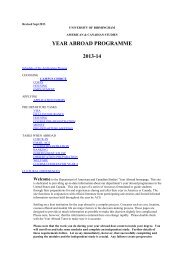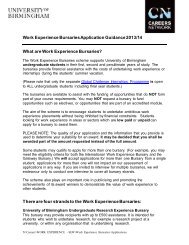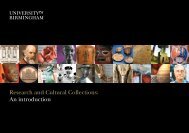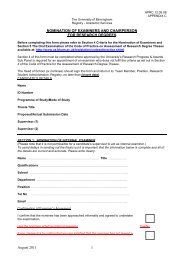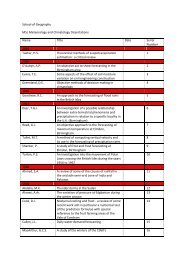reimagining-abstracts - University of Birmingham
reimagining-abstracts - University of Birmingham
reimagining-abstracts - University of Birmingham
Create successful ePaper yourself
Turn your PDF publications into a flip-book with our unique Google optimized e-Paper software.
20th century. This will be undertaken by an integrated analysis <strong>of</strong> intellectual<br />
developments and shifting attitudes to the (prehistoric) past. The investigation will<br />
start in the last decades <strong>of</strong> the 19th century. Schliemann’s spectacular discoveries in<br />
Mycenae coincided with a period <strong>of</strong> internal instability and external pressures when<br />
the consolidation <strong>of</strong> the Greek State was <strong>of</strong> paramount importance. In the first part <strong>of</strong><br />
the paper, we will see how Greek prehistoric archaeologists, under the influence <strong>of</strong><br />
romantic nationalism and despite resistance among more classically trained scholars,<br />
extended Paparrigopoulos’ tripartite scheme <strong>of</strong> linear continuity to include the<br />
prehistoric past. The discussion will also reveal the tensions between classicism and<br />
romanticism, diffusion and evolution, continuity and progress that characterize<br />
scholarship during the late 19th and early 20th centuries. With the failure <strong>of</strong><br />
nationalist and expansionist dreams, the decline <strong>of</strong> the Classical Ideal in the European<br />
history <strong>of</strong> ideas and the onset <strong>of</strong> modernism, intellectual debates on modern Greek<br />
identity shifted away from the veneration <strong>of</strong> the past to issues such the language<br />
debate, the significance <strong>of</strong> authentic manifestations <strong>of</strong> the Greek cultural spirit (e.g.<br />
vernacular architecture, folk art or poetry), or to the Greek landscape in general. At<br />
the same time, the Classical (and increasingly also the pre-historic) past became the<br />
cornerstone <strong>of</strong> the <strong>of</strong>ficial nationalist discourse <strong>of</strong> the Greek state, culminating into<br />
Metaxas’s Third Hellenic Civilization or the colonels’ Helleno-Christian Civilization.<br />
In the second part <strong>of</strong> the paper, we will consider the various positions adopted by<br />
Greek prehistoric archaeologists. These range from a full, almost monolithic<br />
endorsement <strong>of</strong> the nationalist ideology, to more complex and nuanced positions that<br />
apply elements <strong>of</strong> contemporary intellectual debates on Greekness to the pre-historic<br />
past, or redefine the relationship between the prehistoric past and the present.<br />
Eleana Yalouri<br />
eleanayalouri@yahoo.co.uk<br />
The Olympic contest between ‘matter’ and ‘spirit’ in Athens 2004<br />
The staging <strong>of</strong> the Olympic Games is always accompanied by appeals to ‘the Olympic<br />
spirit’ which is usually presented as in danger <strong>of</strong> being buried under the material<br />
world <strong>of</strong> mass consumption and as having nothing to do with the ancient Greek world<br />
<strong>of</strong> ‘lost ideal purity’. In spite <strong>of</strong> the negative nuances attributed the contemporary<br />
material world, the latter has provided potent means <strong>of</strong> expressing the ‘immaterial’,<br />
‘spiritual’ power <strong>of</strong> the Olympics: Olympic torches, flags, and other paraphernalia are<br />
designed to convey and celebrate ‘the true spirit <strong>of</strong> the Games’. The power <strong>of</strong> things<br />
does not simply rest on their ability ‘to represent’, but also on their ability ‘to act’<br />
(Gell 1998, Latour 1993, 1999) upon the world and have consequences on people. So<br />
maybe instead <strong>of</strong> repudiating ‘materiality’ as representing ‘the surface’ that masks<br />
‘the pure spirit’, we may find it more useful to engage with it in order to explore the<br />
ways it is involved in the constitution <strong>of</strong> the modern Greek culture and, more<br />
generally, in the human world (see Miller 2005).<br />
This paper will discuss different examples to explore the separation, the<br />
meshing and the flowing that takes place between these seemingly opposing ends.<br />
Particular reference will be made to the Olympic flame which was thought <strong>of</strong> as the<br />
par excellence manifestation <strong>of</strong> ‘the Olympic spirit'. By oscillating between the<br />
tangible and the transcendental, ‘nature’ and ‘culture’, the past and the present, the<br />
ephemeral and the eternal, the touring flame makes and re-makes literal and<br />
metaphorical borders through which ‘the imagining’ <strong>of</strong> the Greek past and ‘the<br />
dreaming’ <strong>of</strong> the Greek nation (Gourgouris 1996) take place. It becomes a metaphor<br />
that establishes resemblances, creates meanings and provides a meeting ground where<br />
26



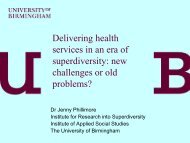
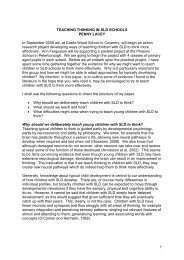
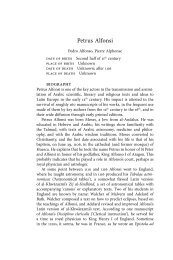
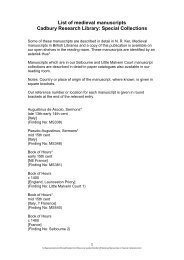
![Benyamin Asadipour-Farsani [EngD Conference abstract]](https://img.yumpu.com/51622940/1/184x260/benyamin-asadipour-farsani-engd-conference-abstract.jpg?quality=85)


